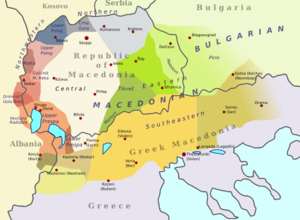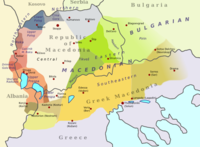| Revision as of 18:25, 5 July 2019 editTrey314159 (talk | contribs)Extended confirmed users6,470 editsm fix homoglyphs: convert Cyrillic characters in IV to Latin← Previous edit |
Latest revision as of 20:39, 8 November 2024 edit undoMonkbot (talk | contribs)Bots3,695,952 editsm Task 20: replace {lang-??} templates with {langx|??} ‹See Tfd› (Replaced 1);Tag: AWB |
| (16 intermediate revisions by 11 users not shown) |
| Line 1: |
Line 1: |
|
|
{{Short description|Dialect of Macedonian}} |
|
] |
|
] |
|
{{Listen |
|
{{Listen |
| Line 9: |
Line 10: |
|
| description2 = Tale told by a woman from the city of ] |
|
| description2 = Tale told by a woman from the city of ] |
|
}} |
|
}} |
|
The '''Prilep-Bitola dialect''' ({{lang-mk|Прилепско-битолски дијалект}}, ''Prilepsko-bitolski dijalekt'') is a member of the central subgroup of the western group of ] of the ]. This dialect is spoken in much of the ] (more specifically, the ], ], ] and ]), as well as by the ] population in and around ] (Lerin)<ref>'''author missing'''. Леринскиот говор. Македонски jазик, 1983, XXXIV, стр. 23-49.</ref><ref>Hill, Peter. The Dialect of Gorno Kalenik 1991, Columbus, OH</ref> in neighbouring ]. The Prilep-Bitola dialect, along with other peripheral west-central dialects, provides much of the basis for modern ].<ref>Makedonska gramatika by Krume Kepeski |
|
The '''Prilep-Bitola dialect''' ({{langx|mk|Прилепско-битолски дијалект}}, ''Prilepsko-bitolski dijalekt'') is a member of the central subgroup of the western group of ]. This dialect is spoken in much of the ] (more specifically, the ], ], ] and ] municipalities), as well as by the ] population in and around ] (Lerin)<ref>{{Cite book |last=Vidoeski|first=Božidar (Божидар Видоески) |title=Lerinskiot govor. |date=1983|pages=23–49 |language=mk |script-title=mk:Леринскиот говор}}</ref><ref>{{Cite book |last=Hill |first=Peter |url=https://books.google.com/books?id=ibxiAAAAMAAJ |title=The Dialect of Gorno Kalenik |date=1991 |publisher=Slavica Publishers |location=Columbus, OH |isbn=9780893572174 |language=en |via=Google Books}}</ref> in neighbouring ]. The Prilep-Bitola dialect, along with other peripheral west-central dialects, provides much of the basis for modern ].<ref>{{Cite journal |last=Lunt |first=Horace G. |date=1951 |title=Makedonska gramatika by Krume Kepeski |journal=Language |language=en |volume=27 |issue=2 |pages=180–187 |doi=10.2307/410435 |jstor=410435}}</ref> ] dialects have developed in the cities of ] and ]. |
|
Language, Vol. 27, No. 2 (Apr–Jun, 1951), pp. 180–187</ref> ] dialects have developed in the cities of ] and ]. |
|
|
|
|
|
|
==Phonological characteristics== |
|
==Phonological characteristics== |
| Line 31: |
Line 31: |
|
*intervocalic consonant ] is typical of this dialect, and elided forms are in ] with non-elided forms: |
|
*intervocalic consonant ] is typical of this dialect, and elided forms are in ] with non-elided forms: |
|
**elision of the intervocalic {{IPA|/v/}}: |
|
**elision of the intervocalic {{IPA|/v/}}: |
|
***in the plural forms of monosyllabic nouns, e.g. ''лебо(в)и'':<ref>Граматика на македонскиот литературен јазик, Блаже Конески, Култура, Скопје 1967, стр.68</ref> |
|
***in the plural forms of monosyllabic nouns, e.g. ''лебо(в)и'':<ref>{{Cite book |last=Koneski |first=Blaže (Блаже Конески) |title=Gramatika na makedonskiot literaturen jazik |date=1967 |publisher=Kultura <!--Култура--> |location=Skopje <!--Скопје--> |pages=68 |language=mk |script-title=mk:Граматика на македонскиот литературен јазик |author-link=Blaže Koneski}}</ref> |
|
::::{{IPA|/ˈlɛbɔvi/}} → {{IPA|/ˈlɛbɔi/}} (realized as {{IPA|}} ~ {{IPA|}}) |
|
::::{{IPA|/ˈlɛbɔvi/}} → {{IPA|/ˈlɛbɔi/}} (realized as {{IPA|}} ~ {{IPA|}}) |
|
::* and in most other positions, e.g. ''то(в)ар'':<ref>Историја на македонскиот јазик, Блаже Конески, Култура, Скопје 1986, стр. 21</ref> |
|
::* and in most other positions, e.g. ''то(в)ар'':<ref>{{Cite book |last=Koneski |first=Blaže (Блаже Конески) |title=Istorija na makedonskiot jazik |date=1986 |publisher=Kultura <!--Култура--> |location=Skopje <!--Скопје--> |pages=21 |language=mk |script-title=mk:Историја на македонскиот јазик }}</ref> |
|
::::{{IPA|/ˈtɔvar/}} → {{IPA|/ˈtɔar/}} (realized as {{IPA|}}) |
|
::::{{IPA|/ˈtɔvar/}} → {{IPA|/ˈtɔar/}} (realized as {{IPA|}}) |
|
:* certain short words (conjunctions, pronouns, determiners, etc.) have undergone further elision, ex.: |
|
:* certain short words (conjunctions, pronouns, determiners, etc.) have undergone further elision, ex.: |
| Line 40: |
Line 40: |
|
::: {{IPA|/ˈkɔɡa/}} (→ {{IPA|/ˈkɔa/}}) → {{IPA|}} (''interr. pron.'' 'when') |
|
::: {{IPA|/ˈkɔɡa/}} (→ {{IPA|/ˈkɔa/}}) → {{IPA|}} (''interr. pron.'' 'when') |
|
*insertion of {{IPA|/t/}} and {{IPA|/d/}} into consonant clusters -{{IPA|/sr/}}- and -{{IPA|/zr/}}-, respectively; for example, {{IPA|/stram/}} from the earlier {{IPA|/sram/}} (''срам'', 'shame') and {{IPA|/zdrɛl/}} from the earlier {{IPA|/zrɛl/}} (''зрел'', 'ripe'). |
|
*insertion of {{IPA|/t/}} and {{IPA|/d/}} into consonant clusters -{{IPA|/sr/}}- and -{{IPA|/zr/}}-, respectively; for example, {{IPA|/stram/}} from the earlier {{IPA|/sram/}} (''срам'', 'shame') and {{IPA|/zdrɛl/}} from the earlier {{IPA|/zrɛl/}} (''зрел'', 'ripe'). |
|
*use of /v/ instead of the archaic /x/: страх (strah) > страв (strav; fear); |
|
*use of /v/ instead of the archaic /x/: страх (strah) > страв ({{transl|mk|italic=no|strav}}; fear); |
|
*In the sub-dialect of ]-], especially among the oldest generations: |
|
*In the sub-dialect of ]-], especially among the oldest generations: |
|
**while {{IPA|}} is an allophone of {{IPA|/l/}} in most dialects (occurring in all positions except before front vowels and {{IPA|/j/}}), in this dialect {{IPA|}} is used instead; ex.: |
|
**while {{IPA|}} is an allophone of {{IPA|/l/}} in most dialects (occurring in all positions except before front vowels and {{IPA|/j/}}), in this dialect {{IPA|}} is used instead; ex.: |
| Line 59: |
Line 59: |
|
*] verbs are typically derived from ] verbs by means of the suffix –ва (e.g. ''зборва'' and ''боледва'') in Bitola dialects, but standard -ува in Prilep dialects; |
|
*] verbs are typically derived from ] verbs by means of the suffix –ва (e.g. ''зборва'' and ''боледва'') in Bitola dialects, but standard -ува in Prilep dialects; |
|
*'expansion' where other dialects have palatalization: ''падина'' ("to fall", sing. present third-person) versus the standard ''паѓа''; |
|
*'expansion' where other dialects have palatalization: ''падина'' ("to fall", sing. present third-person) versus the standard ''паѓа''; |
|
*use of the ] for proper names;<ref>Friedman, Victor (1998), Macedonian: Comparative Grammar, Slavic and East European Language Research Center (SEELRC): p. 22</ref> |
|
*use of the ] for proper names;<ref>{{Citation |last=Friedman |first=Victor |title=Macedonian: Comparative Grammar |date=1998 |pages=22 |publisher=Slavic and East European Language Research Center (SEELRC)}}</ref> |
|
*no distinction between masculine and feminine short possessive pronouns, i.e. consistent use of ''му'' and ''го'' for both genders, in Bitola dialects, but they are used in the plural third person in Prilep; |
|
*no distinction between masculine and feminine short possessive pronouns, i.e. consistent use of ''му'' and ''го'' for both genders, in Bitola dialects, but they are used in the plural third person in Prilep; |
|
*use of -јќум and -јким instead of the standard -јќи for the gerund, in older speakers, e.g. одејќум (while walking). |
|
*use of -јќум and -јким instead of the standard -јќи for the gerund, in older speakers, e.g. одејќум (while walking). |
|
|
|
|
|
==Typical Words== |
|
==Typical words== |
|
⚫ |
*чупе ({{IPA|/ˈt͡ʃupɛ/}}) 'girl' |
|
|
|
|
⚫ |
*преѓе ({{IPA|/ˈprɛɟɛ/}}), преѓеска ({{IPA|/ˈprɛɟɛska/}}) 'recently, lately' |
| ⚫ |
*'''Чупе''' ({{IPA|/ˈt͡ʃupɛ/}}) – 'girl' |
|
|
⚫ |
*модистра ({{IPA|/ˈmɔdistra/}}) 'seamstress' |
| ⚫ |
*'''Преѓе''' ({{IPA|/ˈprɛɟɛ/}}), '''преѓеска''' ({{IPA|/ˈprɛɟɛska/}}) – 'recently, lately' |
|
|
⚫ |
*бендиса ({{IPA|/ˈbɛndisa/}}) 'to have a liking for something or someone', 'to fancy' |
| ⚫ |
*'''Модистра''' ({{IPA|/ˈmɔdistra/}}) – 'seamstress' |
|
|
|
*сурат ({{IPA|/ˈsurat/}}) 'face' |
| ⚫ |
*'''Бендиса''' ({{IPA|/ˈbɛndisa/}}) – 'to have a liking for something or someone', 'to fancy' |
|
|
*'''Сурат''' ({{IPA|/ˈsurat/}}) – 'face' |
|
*плусне ({{IPA|/ˈplusnɛ/}}) 'to fire (a rifle)' |
|
*'''Плусне''' ({{IPA|/ˈplusnɛ/}}) – 'to fire (a rifle)' |
|
*капнат ({{IPA|/ˈkapnat/}}) 'exhausted' |
|
*'''Капнат''' ({{IPA|/ˈkapnat/}}) – 'exhausted' |
|
*греда ({{IPA|/ˈɡrɛda/}}) 'plank', 'beam (of wood)' |
|
*'''Греда''' ({{IPA|/ˈɡrɛda/}}) – 'plank', 'beam (of wood)' |
|
|
|
|
|
|
==Notes== |
|
==Notes== |
The phonological characteristics of the Bitola-Prilep dialect which can also be found in the other peripheral dialects are:


